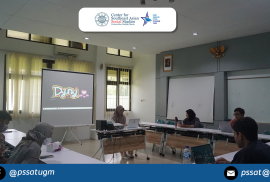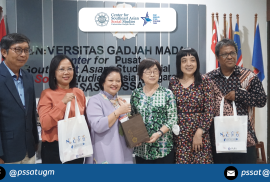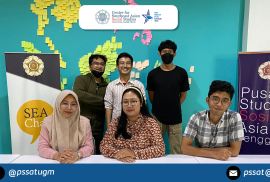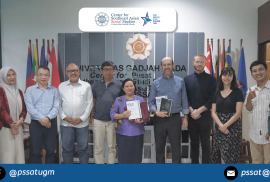Last Friday (3/3), a weekly agenda known as the “sharing session” was held for CESASS internship students. The speaker for the week was Wiweko Rahadian Abyapta, an undergraduate student from the Faculty of Law at Universitas Gadjah Mada, who is also an intern from the first batch of this year. Wiweko presented a topic titled “Sustainable Agriculture in the Philippines” from a policy-making perspective. He shared this topic because he won Best Policy Paper at the Young ASEAN Leaders Policy Initiative 2023.
2023
On Monday (6/3/2023), an intern named Dyny Wahyu Seputri, who is pursuing a Master’s degree in American Studies at Gadjah Mada University, presented her thesis research entitled “Towards a Transnational View: Pencak Silat in the United States of America” in a forum at the PSSAT office. The forum was the 39th Seachat, which is one of the internal activities at PSSAT. The speaker presented her ideas on the direction of the development of Pencak Silat martial arts in the United States.
On 9th February, 2023, an intern, Yumna Amalia Maghfirah, presented about the Philippines Beauty Pageant industry and how it helps the country itself diplomatically and economically, and how the Filipinos support the beauty pageants. SEA CHAT #38 was attended by 13 Indonesian interns and 3 international interns from Myanmar and the Philippines.
The speaker started the presentation by explaining how the beauty pageant emerged from the ancient Greek and 19th century until the 21st century through different major shifts year by year. Later in the 1950s, this developed as decolonisation and rising nationalism. When the beauty pageant became an example of “women empowering women”, and with the purpose of using femininity to represent world issues and raising awareness for culture, the Philippines also applied this as national aspiration.
On Friday (24/02/2023), a student from Myanmar shared her presentation about “Reflection on Childhood” in sharing session as a part of intern’s activity in CESASS office. Her name was Phoo Wai Yan Myint, an international student majoring International Relation in Gadjah Mada University and she shares her opinion about how childhood experience has an impact on behaviour of an adult. This sharing session attended by Indonesian interns and 4 international students from Myanmar and Phillipines.
On Thursday (26/01/2023), Center for Southeast Asia Social Studies Universitas Gadjah Mada (CESASS UGM) was honoured to welcome guests from from National Cheng Chi University (NCCU), Taiwan (ROC): Prof. Herng-Su, Ph.D., the vice president of Taiwan University System (台灣聯大系統副校長) and Prof. Yao-Chueh Juan (Dean of the Faculty of Foreign Languages and Cultures) National Chengchi University. This visit is the first time to UGM.
NCCU guests continued their visit for a courtesy meeting with UGM rector, Faculty of Social and Political Sciences, Faculty of Cultural Sciences, and Center for ASEAN Study Center.
Attendants from CESASS were director Prof. Dr. phil. Hermin Indah Wahyuni, researchers: Drs. Muhadi Sugiono, M.A., Dr. phil. Vissia Ita Yulianto, Drs. Muh. Arif Rahman, M. Hum., Ph.D., staff, and intern of CESASS.
On January, 24th 2023 (GMT +7) Center of Southeast Asian Social Studies (CESASS) Universitas Gadjah Mada held the agenda called SEA CHAT. The #SEACHAT37 entitled ‘If I Was the Director: Breaking the Eurocentric in Postcolonialism and Transnational of Film De Oost’ was presenting by Syfa Amelia as internship student at CESASS from Master Program in Communication Science, Universitas Gadjah Mada.
The discussion was started from Syfa that explained the synopsis of the movie De Oost (The East). This movie was directed by Jim Taihuttu and released in 2020 but it’s still interesting to be discussed until today. Syfa explained the critics from her perspective as a part of post-colony country. Those, from her analysis the movie De Oost (The East) was glorifying the white perspective which made the movie looks un-relevant to the history. Further, cited from Syfa’s explanation she found that there were some scenes that stereotyping Indonesia. Other than that, Syfa choose the movie De Oost (The East) because it is still has its correlation to the Southeast Asian country, especially Indonesia.
Tuesday (17/01), the Center for Southeast Asian Social Studies (CESASS) held an academic discussion forum, 36th Southeast Asia Chat (SEACHAT). On this occasion, a graduate of the Department of Sociology Universitas Gadjah Mada, Ilham Ramadhan D. Arifin, presented his findings about sugar commodities in the Dutch East Indies era on Caribbean and Java islands. To open his presentation, Ilham played a video about the development of sugar cane during the Dutch East Indies era when sugar became the main global commodity from 17th until 19th century.
Prof. Paul K. Gellert Kieran and two students, Cole Phelps and Giuliana Nicole Castillo from Department of Sociology College of Arts and Science, University of Tennessee, US gave a lively discussion in Cesass during their visit at the research center on Thursday 05 January 2023.
Following introductions, both sides shared experiences and challenges on Southeast East Asian studies which continued to be contested in current geopolitical atmosphere. Notwithstanding, those factors attract more scholars from multidisciplinary studies both from international and regional Southeast Asia to do research on not only ASEAN but Southeast Asia in general.
IKAT: The Indonesian Journal of Southeast Asian Studies ISSN 2580-6580 (Print) 2597-9817 (Online) is an academic, open access, and double blind reviewed journal about Southeast Asian societies and cultures. Founded in 2017 at the Center for Southeast Asian Social Studies (CESASS) Universitas Gadjah Mada, Yogyakarta, Indonesia.
The Journal strives to provide new, rigorous and comprehensive knowledge and understanding of Southeast Asia through inter-disciplinary perspectives. Its scopes includes but is not limited to economic welfare, institutional knowledge production, history, political transformations and the social development of information and communication technology in the region. Contributors may focus on an in-depth individual country analysis or on comparing a multi-country case study. Given the mission statement of CESASS, contributors are encouraged to submit empirical, methodological, theoretical, or conceptual articles about Southeast Asia through the eye of social sciences.









